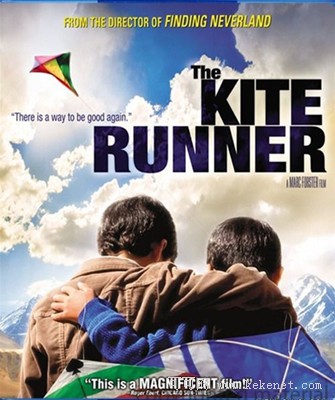(单词翻译:单击)
英文原文
12岁的阿富汗富家少爷阿米尔与仆人哈桑情同手足。然而,在一场风筝比赛后,发生了一件悲惨不堪的事,阿米尔为自己的懦弱感到自责和痛苦,逼走了哈桑,不久,自己也跟随父亲逃往美国。
成年后的阿米尔始终无法原谅自己当年对哈桑的背叛。为了赎罪,阿米尔再度踏上暌违二十多年的故乡,希望能为不幸的好友尽最后一点心力,却发现一个惊天谎言,儿时的噩梦再度重演,阿米尔该如何抉择?小说如此残忍而又美丽,作者以温暖细腻的笔法勾勒人性的本质与救赎,读来令人荡气回肠。
They called him "flat-nosed" because of Ali and Hassan's characteristic Hazara Mongoloid features. For years, that was all I knew about the Hazaras, that they were Mogul descendants, and that they looked a little like Chinese people. School text books barely mentioned them and referred to their ancestry only in passing. Then one day, I was in Baba's study, looking through his stuff, when I found one of my mother's old history books. It was written by an Iranian named Khorami. I blew the dust off it, sneaked it into bed with me that night, and was stunned to find an entire chapter on Hazara history. An entire chapter dedicated to Hassan's people! In it, I read that my people, the Pashtuns, had persecuted and oppressed the Hazaras. It said the Hazaras had tried to rise against the Pashtuns in the nineteenth century, but the Pashtuns had "quelled them with unspeakable violence." The book said that my people had killed the Hazaras, driven them from their lands, burned their Homes, and sold their women. The book said part of the reason Pashtuns had oppressed the Hazaras was that Pashtuns were Sunni Muslims, while Hazaras were Shi'a. The book said a lot of things I didn't know, things my teachers hadn't mentioned. Things Baba hadn't mentioned either. It also said some things I did know, like that people called Hazaras "mice-eating, flat-nosed, load-carrying donkeys". I had heard some of the kids in the neighborhood yell those names to Hassan.
The following week, after class, I showed the book to my teacher and pointed to the chapter on the Hazaras. He skimmed through a couple of pages, snickered, handed the book back. "That's the one thing Shi'a people do well," he said, picking up his papers, "passing themselves as martyrs." He wrinkled his nose when he said the word Shi'a, like it was some kind of disease.
But despite sharing ethnic heritage and family blood, Sanaubar joined the neighborhood kids in taunting Ali. I have heard that she made no secret of her disdain for his appearance.
"This is a husband?" she would sneer. "I have seen old donkeys better suited to be a husband."
In the end, most people suspected the marriage had been an arrangement of sorts between Ali and his uncle, Sanaubar's father. They said Ali had married his cousin to help restore some honor to his uncle's blemished name, even though Ali, who had been orphaned at the age of five, had no worldly possessions or inheritance to speak of.
Ali never retaliated against any of his tormentors, I suppose partly because he could never catch them with that twisted leg dragging behind him. But mostly because Ali was immune to the insults of his assailants; he had found his joy, his antidote, the moment Sanaubar had given birth to Hassan. It had been a simple enough affair. No obstetricians, no anesthesiologists, no fancy monitoring devices. Just Sanaubar lying on a stained, naked mattress with Ali and a midwife helping her. She hadn't needed much help at all, because, even in birth, Hassan was true to his nature:
He was incapable of hurting anyone. A few grunts, a couple of pushes, and out came Hassan. Out he came smiling.
重点精讲
重点精讲:
descendants n. 后代,后裔
They are the descendants of Queen Victoria.
他们是维多利亚女王的后裔。
Etiquette has been passed down from him to his descendants.
他的后裔,一向以礼仪传家。
barely adv. 几乎不;刚刚;勉强
He is so weak that he can barely stand up.
他身体虚弱几乎站不起来。
I had barely started speaking when he interrupted me.
我刚刚开始讲话,他便打断了我。
We had barely enough money to last through the weekend.
我们的钱只能勉强维持到周末。
ancestry n. 祖先
Many of the early settlers in America had English ancestry.
许多早期美国移民的祖先都是英国人。
sneak v. 偷偷摸摸地做,偷偷地拿、带
He sneaked a chocolate from the box.
他从盒子里偷拿了一块巧克力。
I'll see if I can sneak him in after dark.
我看天黑后能否让他偷偷地溜进去。
I can sneak you out without being noticed.
我能把你偷偷地带出去,别人了现不了。
stunned adj. 震惊的,惊讶的
One woman was stunned as, ironically, the ladybirds seemed to be attracted to her canary yellow VW Beetle.
一名妇女被震惊的,讽刺的是,瓢虫似乎是吸引她的淡黄色大众甲壳虫。
Stunned by the market response, lawmakers regrouped and added new items to the bill to win votes.
被市场反应所震惊的议员们随后再次集结,向救助计划加入新内容以期获得支持。
persecute v. 迫害
They persecute those who do not conform to their idea.
他们迫害那些不信奉他们思想的人。
They came to America after being persecuted for their religious beliefs.
他们是在他们因宗教信仰而受到迫害之后来到美洲的。
rise v. 反抗
The king's cruelty excited the people to rise against him.
那个国王的残酷激起了人民起来反对他。
quell v. 压制,平息
Soldiers were sent in to quell the riots.
已派士兵去镇压动乱。
The armed force had to be called out to quell violence.
不得不出动军队来镇压暴力行动。
snicker v. 切窃笑
The shuffle and snicker become the comedian's trademark.
搅和与窃笑成为那个戏剧演员的标志。
martyr n. 烈士,殉道者
He is a martyr of his country.
他为国捐躯。
He was posthumously accepted as a martyr.
他被追认为烈士。
heritage n. 遗产,继承物
It is the heritage of all human beings.
这都是整个人类继承的东西。
taunt v. 辱骂,嘲弄
But in England if the palm faces inward it's a taunt, especially if executed with an up-ward jerk of the fingers.
可在英国,做该手势时如果掌心向内,特别是还同时把手指往上伸的话,则表示对人的辱骂。
suspect v. 怀疑,猜想
They suspected an ambush.
他们怀疑有埋伏。
I suspect he was lying by the boy's abnormal behaviour.
从那个男孩的反常举动中,我怀疑他在撒谎。
restore v. 回复,还原,复原
The new manager's job is to restore the company to profitability.
新经理的工作是让这家公司能恢复盈利状况。
I feel quite restored to health after my holiday.
假期过后,我觉得健康恢复得相当不错。
blemish v. 玷污,损害
His reputation was blemished by a newspaper article alleging he had taken bribes.
报纸上一篇文章说他受贿,他的声誉因此受到玷污。
retaliate v. 报复,回敬
He was waiting for an opportunity to retaliate.
他在伺机报复。
He slapped his sister, who retaliated by kicking him.
他打了妹妹一巴掌,他妹妹回敬他一脚。
tormentor n. 使人痛苦的人或物
Vowing revenge, he got hold of a gun and tracked down his tormentor.
他发誓要报仇,弄了一把枪,跟踪着殴打他的人而去。
immune adj. 免疫的
I'm immune to smallpox as a result of vaccination.
我接种过疫苗了,所以对天花有免疫力。
anesthesiologist n. 麻醉学家,麻醉师
The anesthesiologist told me I was the calmest person he'd ever seen.
麻醉师告诉我说,我是他所见到的最镇定的人。
中文译文
他们管他叫塌鼻子,因为阿里和哈桑是哈扎拉人,有典型的蒙古人种外貌。很长一段时间内,我对哈扎拉人的了解就这么多:他们是蒙古人的后裔,跟中国人稍微有些相似。学校的教材对他们语焉不详,仅仅提到过他们的祖先。有一天,我在爸爸的书房翻阅他的东西,发现有本妈妈留下的旧历史书,作者是伊朗人,叫寇拉米。我吹去蒙在书上的尘灰,那天晚上偷偷将它带上床,吃惊地发现里面关于哈扎拉人的故事竟然写了满满一章。整整一章都是关于哈扎拉人的!我从中读到自己的族人——普什图人(Pashtuns,阿富汗人口最多的民族,其语言普什图语为阿富汗国语)曾经迫害和剥削哈扎拉人。它提到19世纪时,哈扎拉人曾试图反抗普什图人,但普什图人以罄竹难书的暴行镇压了他们。书中说我的族人对哈扎拉人妄加杀戮,迫使他们离乡背井,烧焚他们的家园,贩售他们的女人。书中认为,普什图人压迫哈扎拉人的原因,部分是由于前者是逊尼派穆斯林,而后者是什叶派。那本书记载着很多我不知道的事情,那些事情我的老师从未提及,爸爸也缄口不谈。它还诉说着一些我已经知道的事情,比如人们管哈扎拉人叫吃老鼠的人、塌鼻子、载货蠢驴等。我曾听到有些邻居的小孩这么辱骂哈桑。
随后那个星期,有天下课,我把那本书给老师看,指着关于哈扎拉人那一章。他翻了几页,嗤之以鼻地把书还给我。这件事什叶派最拿手了,他边收拾自己的教案边说,把他们自己送上西天,还当是殉道呢。提到什叶派这个词的时候,他皱了皱鼻子,仿佛那是某种疾病。
虽说同属一族,甚至同根所生,但莎娜芭也加入到邻居小孩取笑阿里的行列里去了。据说她憎恶他的相貌,已经到了尽人皆知的地步。
这是个丈夫吗?她会冷笑着说,我看嫁头老驴子都比嫁给他好。
最终,人们都猜测这桩婚事是阿里和他叔叔——也就是莎娜芭的父亲之间的某种协定。他们说阿里娶他的堂妹,是为了给声名受辱的叔叔恢复一点荣誉,尽管阿里五岁痛失牯持,也并无值得一提的财物或遗产。
阿里对这些侮辱总是默默以待,我认为这跟他畸形的腿有关:他不可能逮到他们。但更主要的是,这些欺辱对他来说毫不见效,在莎娜芭生下哈桑那一刻,他已经找到他的快乐、他的灵丹妙药。那真是足够简单的事情,没有产科医生,也没有麻醉师,更没有那些稀奇古怪的仪器设备。只有莎娜芭躺在一张脏兮兮的褥子上,身下什么也没垫着,阿里和接生婆在旁边帮手。她根本就不需要任何帮助,因为,即使在降临人世的时候,哈桑也是不改本色——他无法伤害任何人。几声呻吟,数下推动,哈桑就出来了。脸带微笑地出来了。



